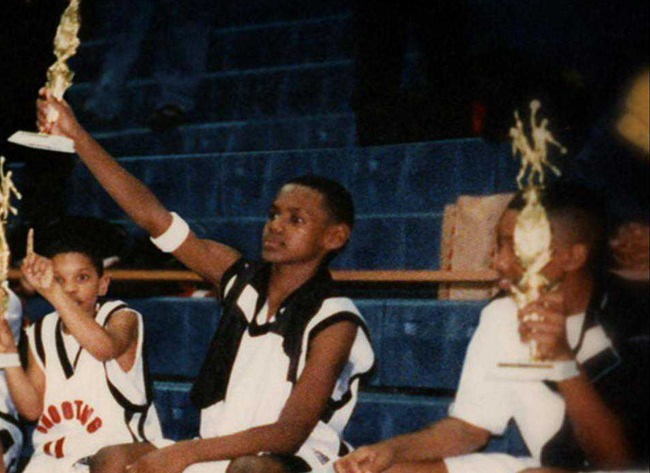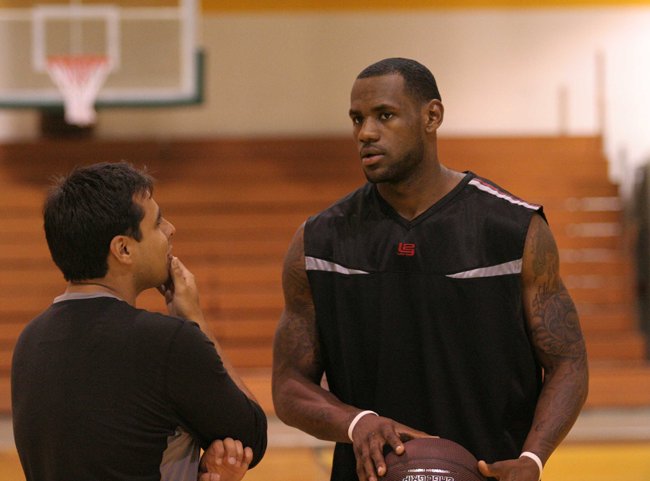CHICAGO – The Steppenwolf Theatre of Chicago continues to provide different viewpoints on the American stage, and their latest “Little Bear Ridge Road” is no exception. Featuring ensemble member Laurie Metcalf, it’s the resonate story of a family at the crossroads. For tickets/details, click LITTLE BEAR.
Interview: Kristopher Belman Documents LeBron James in ‘More Than a Game’
CHICAGO – “More Than a Game” has to be one of the luckiest documentaries ever made. Director Kristopher Belman began taping a some freshman high school basketball players in 1998. One of those players was future NBA superstar LeBron James.
Belman picked this particular group of b-ballers for a three reasons: One, they were from his hometown of Akron, Ohio. Two, he needed a college documentary project. And finally, the core group of players (which included Lebron James) had been together as teammates since the sixth grade. Belman took notice of them as high schoolers, right after they had lost the national AAU championship as eighth graders.
So began a journey that documents these “fab five” hoopsters from children to men in a scant four years. During that time the team’s nucleus – Willie McGee, Romeo Travis, Dru Joyce III, Sian Cotton, LeBron James and Coach Dru Joyce II – would accumulate a mind-blowing 103 wins, only 5 losses and would always challenge the top tier talent from all over the country. Of course along the way, the team also produced the next “King of the Athletes,” LeBron James.
With the DVD release of More Than a Game set for February 2nd, HollywoodChicago interviewed Kristopher Belman when he was in Chicago last August. His perspective, his luck and the respect he has for these dedicated Akron fellow travelers shines through in his remarks about the journey he took in making this unique documentary.
 Photo credit: © 2009 Lionsgate |
HollywoodChicago: Okay, you said this started as a school project. At what point did the light come on and you thought to yourself, I have a documentary?
Kristopher Belman: Honestly, at the first practice, I thought there was something bigger than just the original idea of a ten minute project. I definitely didn’t think it would be a feature film, or that we would be here eventually talking about it, no way.
I did sense something special in those boys and their relationship. Just seeing them in the locker room before practices, finishing each other’s sentences. Without even knowing anything, you can tell that they’ve known each for a long time. For me that was cool, and thought it was bigger than the imminent project.
I knew it would be a feature length documentary about half way through their Senior season. All these natural pitfalls were coming their way and they were overcoming them. At that point, I was much more familiar with them as individual characters, and what their stories can be.
It’s one thing to have the main story, then to know that the guys could carry themselves, I just had to figure out what their individual story arcs were.
HC: How much did the documentary “Hoop Dreams” from 1994 influence you in your approach to your documentary?
KB: I don’t see Hoop Dreams in the approach to the documentary, but I will say Hoop Dreams inspires me as a filmmaker and I have nothing but the utmost respect for that film. I think it’s a true documentary in every sense of the word. The main difference is we do take a retrospective look, a lot the interviews are looking back. Hoop Dreams was immediate, they were there.
HC: You have some brilliant and one-of-a-kind devices to advance the narrative – the graphic news headlines, the picture usage, the rolling board of the rankings climb of their team. Did the ideas come about as you were formulating the story or are they something you wanted to apply before putting the footage together?
KB: Most of that came together in post-production. In working with an editor, I was able to sit there and figure out what kind of devices will help drive certain scenes, to drive whatever emotion you’re trying to get across. I was blessed to work with an extremely talented visual effects artist, Stefan Nadelman.
What’s great about Stefan is that he doesn’t know anything about basketball. I thought that was awesome. His background was more in artsy projects, and I was looking in this documentary to do a lot of things that weren’t standard documentary-type things, especially with the visual effects. I was looking to break new ground, to reach audiences who don’t necessarily see documentaries, like kids.
HC: One of the points of the story approached but didn’t flesh out was the fact that four African American kids chose a Catholic School over a more established African American public school. How were the kids lives changed by the Catholic School experience or did their basketball “jobs” make them a separate entity of the school?
KB: I think their lives were definitely changed, just because of the private education in general. The boys knew going into that Freshman year that the curriculum would be a lot harder, there would be a dress code and certain things that they weren’t used to was going to be enforced. I think that forced them to take on new responsibilities and mature a little bit quicker.
 Photo credit: © 2009 Lionsgate |
HC: I loved the fact that the crowd went “ooh” when LeBron missed that shot in the AAU eighth grade finals. How much balance did you want between game action and the story of the fab five’s journey?
KB: When people ask me what the film is about, the first thing I say that it’s about friendship. It’s a film about family told through the sport of basketball.
While basketball footage is prevalent on the screen, there needed to be a balance. We needed to have more context off the court, even if it wasn’t visual. And what’s happening on the court needs to speak to what was happening off-court.
HC: You spoke of the wealth of riches in the story: LeBron’s fame, the suspension, the significant wins and losses. In the end of it all, what aspects of karma – as in what goes around comes around – became apparent as the story unfolded?
KB: I think the boys just had so much success as friends and players, on and off the court, that by Junior year it definitely caught up with them. That’s when things went off track. Even Coach Dru will admit that he wasn’t thinking about the team correctly that year, he got too caught up in winning and losing. Those factors bit them in that year, which ended in a major loss.
But how they bounced back from that is the karmic retribution. They immediately made Romeo Travis – who before was seen as an outsider since he wasn’t part of the grade school team – part of the Senior year plans. That helped the team and especially helped Romeo, and they ended up winning because of it.
HC: You observed close up a team experience and journey through the African American perspective. What surprised you about it?
KB: I was surprised on how willingly the team accepted me and how quickly they and their families trusted me. What I took out of it was that in the African American community, when you are part of it, you are a true member of the family. Maybe that trust has to be earned, but once you get it, they will as a community do anything for you.
Photo credit: Patrick McDonald for HollywoodChicago.com |
HC: What other subjects came out of this documentary that possibly could have its own documentary?
KB: Coach Dru makes an observation toward the end of the film that questions whether the player’s childhoods were taken away. The film doesn’t answer it in dialogue but with LeBron waving a towel and the guys holding each other in celebration. That answers the question. Their childhood wasn’t taken away, it was given to them.
But sports in association with kids can do the opposite, it can take a childhood away, and that is something that maybe would be a separate subject to explore.
HC: What documentary makers do you admire or aspire to? Do you plan to make this a specialty in your career or do you envision doing a fictional film?
KB: I would like to do a narrative film, but I have the utmost respect for documentaries having gone through this experience. I will definitely do it again.
I was influenced by Hoop Dreams, as we mentioned. I was was also influenced by “Murderball” [2005], especially since they had an ensemble cast like my film, and how do you tell six stories at once? The film used a sport, showed off-court activities and still established the characters. It really inspired me.
HC: Finally, after knowing LeBron James from childhood to now, what do you respect about him the most, especially in the face of outlandish fame?
KB: I respect the fact that he remains true to who he is. He’s changed since he’s entered the NBA, but he changed in a way that remained true to how he had always been.
I remember the first day I met them at the high school. I was explaining that this was a school project and all, and I was nervous. LeBron was the one that said, ‘All right, everything you shoot has to be authentic.’ Even as a high schooler he had that confidence to tell me to document them honestly.
That really shows who he is today. If he does certain things or makes certain decisions, they are very true to who he is. He stands up for that.
 | By PATRICK McDONALD |


